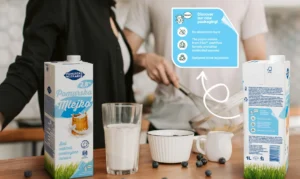Wednesday, 18 February 2026
Precision Baking for Climate-Conscious World: Vision Behind Bühler’s OptiBake
Johannes Greil, Head of Product Management, Wafer As the global food industry increasingly faces pressure to reduce energy consumption, lower emissions, and improve workplace conditions, innovation in production technologies has become more critical than ever.…

Johannes Greil, Head of Product Management, Wafer
As the global food industry increasingly faces pressure to reduce energy consumption, lower emissions, and improve workplace conditions, innovation in production technologies has become more critical than ever. Bühler Group, a leading provider of food processing solutions, has risen to the challenge with the launch of OptiBake, a next-generation wafer baking system that utilises advanced induction heating to redefine energy efficiency, safety, and product quality.
At the core of this innovation is a straightforward yet powerful idea: what if wafer baking were completely reinvented to meet the demands of modern, environmentally conscious manufacturing? In an exclusive interview with NUFFOODS Spectrum, Johannes Greil, Head of Product Management for Wafer at Bühler, discusses how this vision led to the development of OptiBake, a system capable of reducing energy consumption by up to 50 per cent while ensuring precise temperature control and unmatched flexibility.
What inspired Bühler Group to develop OptiBake, and why is now the right time for such a technology in the wafer baking industry?
The inspiration for OptiBake began five years ago with a bold vision: to completely rethink the way wafers are baked. We asked ourselves, “What would a wafer line look like if it were built from scratch today?” This question sparked a journey of innovation. Drawing on our experience with induction heating technology for wafer stick production, we explored applying this technology to other solutions. About three and a half years ago, we started developing an induction heating system specifically tailored for flat and hollow wafer baking. The primary advantage of this technology is its exceptional energy efficiency. With the industry facing challenges such as fluctuating energy prices and uncertain gas supplies, there is growing demand to shift from gas to electricity and reduce overall energy consumption. Our experience with the Franz Haas EWB wafer stick oven demonstrated that induction heating is significantly more efficient than traditional gas or electric systems used in wafer ovens. Driven by these compelling commercial benefits and the increasing pressure to reduce carbon emissions and move away from fossil fuels, this development was the logical way forward. As many of our partners set ambitious sustainability targets and regulatory requirements evolve globally, OptiBake embodies Bühler’s commitment to sustainability. It is a future-oriented solution designed to meet the needs of today’s climate-conscious manufacturing environment and to provide them with the right tools to increase production efficiency on multiple levels.
Could you explain how OptiBake’s system works and why it’s a breakthrough for food production?
OptiBake uses inductive heating, a method that generates heat directly within the baking plates rather than relying on the less efficient heat transfer of traditional gas or electric ovens. By applying heat precisely and only where it is needed, this technology reduces heat losses drastically and therefore boosts energy efficiency by up to 50%. The induction system further enables each baking plate to be individually temperature controlled through a new and patented control system, allowing for highly flexible production scaling, whether responding to process interruptions further along the line or quickly adapting to changing production requirements. This level of precision ensures optimal temperature control, outstanding product quality, and unmatched operational versatility. Central to this advancement is OptiBake’s revolutionary design, based on Bühler’s acclaimed self-supporting baking plate concept. The plates feature a completely flat backside, a new centre adjustment mechanism, enhanced stiffness, and optimised heat conductivity, delivering both performance and the highest wafer sheet quality. Safety and cleanliness have also greatly improved with the shift to induction heating. Fire safety has become a non-issue; the temperatures in the baking chamber are significantly lower, which benefits the mechanical and moving components in the oven, such as bearings. The bubble waste stays clean, as there are no flames in the oven anymore. An exceptional additional benefit is the low operating noise of the oven, which clearly benefits the operators who work in a factory environment every day. Altogether, OptiBake embodies the next-generation baking: energy-efficient, safe, clean, and tailored to the needs of operators and maintenance personnel.
Sustainability is top of mind for many food producers. How does OptiBake support greener, more responsible manufacturing practices in the bakery sector?
The biggest impact, of course, is that the oven does not generate any direct emissions and at the same time helps to reduce overall energy demand for baking, achieving an impressive reduction in energy consumption of up to 50% compared to conventional gas-heated ovens. Even though the temperature in the baking chamber is much lower as a result, it also facilitates the implementation of heat recovery systems, since the extracted air is much cleaner and holds a lot more condensed water vapor. In addition to the advantages of addressing sustainability targets and reducing energy needs, the design also offers many additional benefits that directly target the operator’s well-being during production. One key highlight is the very low operating noise of the oven. Anyone who has stood next to a standard gas oven knows the noise generated by its gas system. This noise has been eliminated. During our launch event in early May this year, we held several presentations right beside the running oven – without any disturbance. In fact, the new oven significantly improves the operating environment, making it more pleasant for operators. Another significant benefit is that the bubble waste — which, to a certain degree, is a technological necessity when baking flat or hollow wafers — is completely clean and can be repurposed for higher-value processes. Lastly, as industries increasingly move toward electrification, OptiBake stands out with the operational flexibility needed to meet future demands.
Does the switch to induction heating affect the taste, texture, or quality of the wafers in any way? What benefits do food manufacturers see in the end product?
A wafer will always be a wafer. Each producer brings their own unique recipes and signature product characteristics, and that won’t change. What OptiBake brings to the table is a new level of consistency and control in the baking process. Thanks to its precise temperature control, and exceptional flexibility to respond to changing production requirements, OptiBake ensures a more uniform product quality batch after batch — both for the wafer sheet itself and ultimately for the f inal wafer product. These improvements directly translate to higher productivity and consistency, especially in key factors such as weight and moisture distribution. Producers benefit from greater product consistency and much greater flexibility, delivering a superior wafer with every bake. As a result, a perfect wafer sheet, produced efficiently, directly contributes to lower production costs by optimizing raw material usage and minimizing waste throughout the entire wafer production process. Thanks to OptiBake’s advanced adjustability, manufacturers can fine-tune wafer characteristics to exact specifications, achieving more with less and further improving the line’s efficiency.
Are there any specific types of wafer products or production scales for which OptiBake is especially well-suited?
The OptiBake oven is engineered to bake all kinds of flat and hollow wafers. During its development, we rigorously tested numerous types of both flat and hollow wafers and found that it has never been easier to switch between different types of wafers. The advantages of its advanced heating system, combined with easy and precise adjustment options, are especially evident when it comes to product and recipe flexibility. With OptiBake, there are no limits to creativity!
Looking ahead, how do you see technologies like OptiBake shaping the future of food manufacturing and consumer expectations around sustainable sourcing?
Looking ahead, technologies like OptiBake will play a pivotal role in reshaping the food manufacturing landscape to align with consumers’ growing demands for sustainable sourcing and transparency. As consumers increasingly prioritise the environmental impact of the foods they buy, manufacturers must deliver on both quality and accountability. OptiBake’s real-time energy monitoring and process optimisation not only drive operational efficiency but also empower manufacturers to track and reduce their carbon footprint, supporting a decarbonised and climate-resilient food system. Its integration into digital ecosystems ensures that manufacturers can provide traceability and transparency, allowing consumers to make informed choices about the origins and sustainability of their food. In essence, OptiBake represents the future of food manufacturing: one that is efficient, responsible, and responsive to the evolving expectations of today’s conscious consumers.
Shraddha Warde
shraddha.warde@mmactiv.com
Technology
Carlsberg Launches AI-Crafted Lunar New Year Packaging
Feb 17, 2026 | Beverages
FAO Experts Assess Risk of Antimicrobial Resistance Spreading via Food Loss and Waste
Feb 17, 2026 | Sustainability
Food Testing
Redefining Trust in Organic Foods through Independent Testing
Feb 13, 2026 | Food Safety and Testing
AFNOR International Eyes Global Food Safety Growth with HACCP Group Takeover
Feb 04, 2026 | Australia
More Popular
Hormel Foods Announces Agreement to Sell Whole-Bird Turkey Business to Life-Science Innovations
Feb 18, 2026 | Company News
Kodiak Expands Frozen Lineup with No Sugar Added Homestyle Power Waffles
Feb 18, 2026 | Company News






